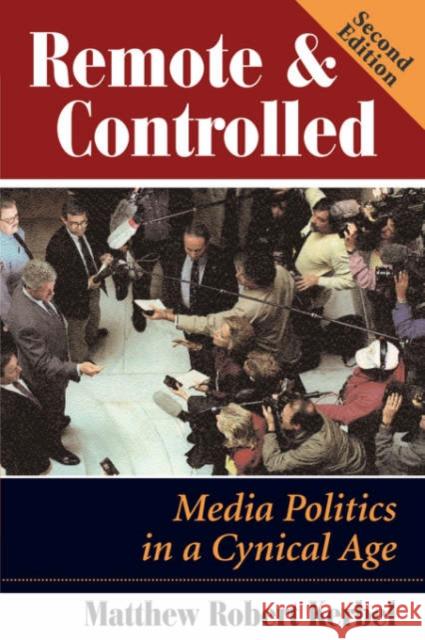Remote and Controlled: Media Politics in a Cynical Age, Second Edition » książka
Remote and Controlled: Media Politics in a Cynical Age, Second Edition
ISBN-13: 9780813368696 / Angielski / Miękka / 1998 / 190 str.
Remote and Controlled: Media Politics in a Cynical Age, Second Edition
ISBN-13: 9780813368696 / Angielski / Miękka / 1998 / 190 str.
(netto: 194,67 VAT: 5%)
Najniższa cena z 30 dni: 186,33
ok. 16-18 dni roboczych.
Darmowa dostawa!
Given how the media portray the political system, how can we educate ourselves about politics without feeling alienated? The amount of information now available to the public about government is without precedent, and contemporary media bring the political action closer than ever before. But in an age when reports on the manipulative behavior and character flaws of public figures appear as frequently as coverage of policy issues, many people are tuning out.Remote and Controlled examines the issue of widespread cynicism in an era of abundant information, asking whether it is possible to consume a steady diet of mainstream media and still understand and respect the political process. Starting with central examples of television's political coverage and the media's focus on the president, the author explores a variety of mediafrom newspapers and radio to MTV and computer networksand political events and institutions. Both electoral politics and governance are explored through examples that range from FDR's fireside radio chats and the Kennedy-Nixon television debates to Vietnam and Watergate, on up to Clinton's war room, Perot's infomercials, C-SPAN and Congress, and the Monica Lewinsky scandal.Against a historical backdrop of political, technological, and institutional change, the text raises critical questions for a society plugged into Rush, Oprah, and USA Today: How do the media both magnify and undermine the president? Can televised town meetings replace the real thing? How do politicians seek to control the flow of information, and what do the media do about it? Does the information explosion provide greater diversity or simply greater convenience? The second edition of this acclaimed text has been revised and updated to examine media coverage of recent events including the Monica Lewinsky scandal and other high-profile stories. In the process, the author sheds light on the ultimate dilemma of whether an informed public will participate in a system in which campaigns are portrayed as if they were war, policymaking is depicted as if it were a campaign, and none of the participantsreporters includedappears particularly noble or worthy."











